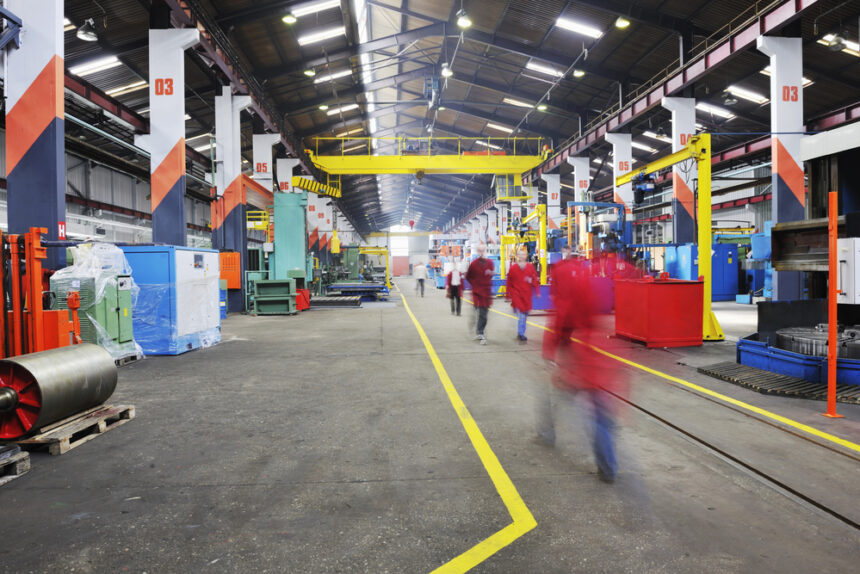 Technological advancements have brought an industrial revolution, with each sector adopting technologies to improve efficiency, reduce operational costs, and enhance the quality of product. One of the major technologies making waves in the industrial sector in the past decade is automation.
Technological advancements have brought an industrial revolution, with each sector adopting technologies to improve efficiency, reduce operational costs, and enhance the quality of product. One of the major technologies making waves in the industrial sector in the past decade is automation.
The industrial sector has been automating mundane, rule-based, and repetitive processes to save labor costs, achieve flexibility, ensure safety, and improve production output. This gave rise to a technology-backed and innovative market known as industrial process automation.
Industrial Process Automation: A Brief Introduction
Industrial process automation involves the application of smart technologies to industrial processes to automate mundane and repetitive tasks. It also works to develop efficient and automated workflows. Various sensors, software, computer technologies, and control devices can be integrated into industrial process systems for streamlining and optimizing processes.
Advanced technologies such as distributed control system (DCS), supervisory control & data acquisition (SCADA), and programmable control logic (PLC) have been utilized for developing industrial process systems and achieving automation. The major objective is accelerating production activities, achieving more output than before, and improving overall operational efficiency.
Growth Rate of the Global Industrial Automation Market
According to a report published by Next Move Strategy Consulting, the global industrial process automation market reached $58.36 billion in 2023, and is estimated to reach $96.06 billion by 2030, registering a CAGR of 5.4% from 2023 to 2030. The implementation of IIoT technologies, collaborations, and the Industry 4.0 revolution are expected to continue to drive the market. Furthermore, innovative technologies will create new opportunities in the next few years.
Key Applications for Industrial Process Automation
From quality control and monitoring and inspection to assembly and packaging, automation has impacted different applications in almost every sector. Industrial process automation can be implemented in oil and gas, energy and power, pharmaceutical, metal and mining, and many other industries. For example, in the oil and gas sector, drilling and pipe-handling processes can be automated. As remote and offshore locations and risky handling processes are common in this sector, process automation will significantly accelerate the efficiency and ensure the safety of human workers.
The pharmaceutical sector has a wide range of applications for automation, such as controlling flow rates, temperature, and pressure during the production of medicines and the packaging of medicines. The metal and mining industry is also transitioning toward automation rapidly. From excavation and mining to transporting materials within mines, automation can play a key role in improving efficiency, reducing labor costs, and achieving safety.
Major Driving Forces and Challenges
The adoption of the industrial Internet of Things (IIoT) is a major driving force behind the growth of the industrial process automation market worldwide. The adoption is driven by accelerating manufacturing processes, increasing the output, and improving customer experience. According to IoT Analytics, nearly 75% of all the devices will be IoT in the future. The industrial sector will utilize the majority of these devices to automate and accelerate processes.
Furthermore, supportive government initiatives promoting the industrial automation will also help drive market growth. With the support of government policies and technological advancements, market players are collaborating, utilizing the strengths and capabilities of each other to achieve higher efficiency and market share. For example, Emirates Global Aluminum (EGA) collaborated with Microsoft UAE for speeding up the Industry 4.0 adoption in various industries in the UAE. This move is targeted at establishing the best practices in the aluminum industry and enhancing the sustainability practices in EGA’s operations.
On the other hand, the lack of standardized security standards and guidelines to develop industrial process automation systems raises cybersecurity concerns. This factor poses challenges for adoption as companies are hesitant to invest in automation technologies. However, investments are estimated to increase with technological advancements for tackling cybersecurity challenges.
Countries & Regions Experiencing Market Growth
The adoption of industrial process automation is increasing significantly across the world. However, the European region held the highest share in 2022, and is expected to maintain its dominance by 2030, as stated by a Next Move Strategy Consulting report. This is due to the advancements in industrial robotics, 5G networks, edge computing, and blockchain technology that facilitate companies in implementing automation processes. Countries such as Germany have a huge automotive sector that implemented industrial process automation systems for accelerating operations and improving efficiency. Furthermore, France is estimated to grow at a steady growth rate with the adoption of IoT, machine-to-machine (M2M), and other technologies. A report by Next Move Strategy Consulting on the European industrial process automation market states that the market is estimated to reach $27.75 billion by 2030, growing at a CAGR of 4.11% from 2023 to 2030.
On the other hand, Asia-Pacific is expected to grow at the fastest growth rate by 2030. This is due to the rising adoption of automation in sectors such as oil and gas, pharmaceuticals, power, and chemicals. The rise in adoption of the Industry 4.0 in countries, including India, China, and Indonesia, helps drive the demand for industrial process automation systems.
Top Industrial Process Automation Companies
Top companies in the industrial process automation market include Hitachi Ltd., Siemens AG, Schneider Electric, Mitsubishi Electric, ABB Ltd., Honeywell International, Toshiba Corp., Emerson Electric Co., Rockwell Automation, Omron Corp., Fanuc Corp., and others. These market players are adopting various strategies to raise their market shares and achieve dominance.
In a recent instance, Schneider Electric joined hands with Accenture to develop a Digital Services Factory (DSF). This program boosts digital innovation initiatives and commercializing new products. With DSF, Schneider Electric reduced the time for the development and launch of digital services by nearly 80%. Such collaborations are expected to continue in the coming years.
Where to Learn More
For more extensive industrial process automation industry analysis, read the report Industrial Process Automation Market, which provides a comprehensive analysis of driving forces, historical analysis, and forecasts along with detailed research and insights on market share, dynamics, countries, and regions.
Next Move Strategy Consulting has also published dozens of other targeted reports analyzing the industrial process automation market within a wide range of different countries. Search the collection to find the data you need.
About the Author
 Arjun Chetry is an accomplished researcher and author of several strategically analyzed research reports. With his current position as an industry analyst, he has a keen eye for analyzing industry trends and understanding consumer behavior. His dedication to exploring diverse subjects and conducting in-depth analyses has equipped him with a deep understanding of research intricacies. He remains committed to staying up-to-date with the latest market trends and recognizing their impact on business and society. His well-rounded interests and experiences contribute to his ability to offer insights and perspectives on various topics.
Arjun Chetry is an accomplished researcher and author of several strategically analyzed research reports. With his current position as an industry analyst, he has a keen eye for analyzing industry trends and understanding consumer behavior. His dedication to exploring diverse subjects and conducting in-depth analyses has equipped him with a deep understanding of research intricacies. He remains committed to staying up-to-date with the latest market trends and recognizing their impact on business and society. His well-rounded interests and experiences contribute to his ability to offer insights and perspectives on various topics.
About Next Move Strategy Consulting
Next Move Strategy Consulting is a premier market research and management consulting firm committed to delivering high-quality market research reports across 10 different industry verticals. Our analysts are constantly tracking various high-growth markets and identifying hidden opportunities in each sector.








